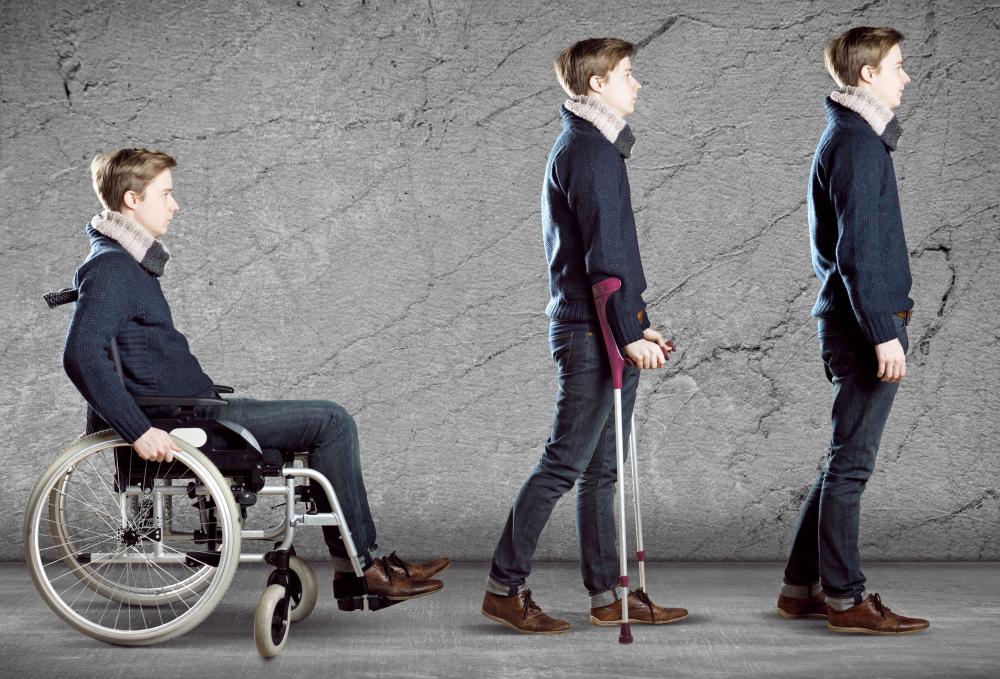At WiseGEEK, we're committed to delivering accurate, trustworthy information. Our expert-authored content is rigorously fact-checked and sourced from credible authorities. Discover how we uphold the highest standards in providing you with reliable knowledge.
What is Poliomyelitis?
Poliomyelitis is known more generally as polio in most parts of the world, and it is an illness that can be mild to extremely severe. The thought of a child contracting severe forms of poliomyelitis was one that haunted parents in many parts of the world up until the mid 1950s. This is when Dr. Jonas Salk announced he had developed a vaccine to prevent contagion.
With efforts to make sure all children were vaccinated, gradually the threat of this illness receded, and many parts of the globe no longer report incidences of infection with the wild virus, though a few may get it from the oral polio vaccine (OPV). Another type of vaccine using dead poliomyelitis virus is now recommended in many places since it considered less risky. Despite a widely available vaccine since the 1950s, there are still places were poliomyelitis is problematic, including parts of the Middle East, and people traveling to remote areas should check to see if they need additional poliomyelitis protection. There is also concern about a growing number of people who choose not to vaccinate their kids, since this might reintroduce the virus in places where it was formerly thought eradicated.

Polio is easily contracted where it occurs naturally, and among unvaccinated populations. It may travel in contaminated water or food or be spread by anal to oral contact. Most people who get the illness will suffer from nonparalytic forms of poliomyelitis. They may have symptoms of fever, sore throat, vomiting, muscle pains, stiff muscles, and sometimes meningitis. A more severe form of the illness is called paralytic polio, and it can begin with the same symptoms. About 10 days in, these suddenly change to include spasms in the muscles, paralysis of the limbs, and total loss of normal reflexes.

Paralytic poliomyelitis may affect the spine, the brainstem, or both. When the brainstem is affected, breathing may become difficult and a breathing machine may be required to prevent death. When any form of paralytic polio occurs, damage to the body’s limbs may be permanent, and many people lose lifelong function of certain areas of the body.
Another complication occurring with this virus is post-polio syndrome, which occurs about 30 years after the disease. This syndrome may cause trouble with breathing, with muscle function, or weakness in the muscles and joint pain. Like paralytic polio, post-polio syndrome may require occupational and physical therapy to retain some function in the affected areas.

The best treatment for poliomyelitis is not to get it. When it is contracted, evidence that the condition may develop into paralytic forms is watched for closely. There is no cure for the virus, but where available hospitalization or quarantine may be required to prevent spread of the illness for unvaccinated populations. In hospitals, patients may receive medications to help with muscle pain or fever, and antibiotics if they develop secondary infections. However, no treatment adequately addresses the condition, and it must run its course, hopefully not terminating in types of paralytic polio.
AS FEATURED ON:
AS FEATURED ON:















Discussion Comments
I got a polio vaccine before I started to school. That was injected. I then received the oral vaccine as a booster when I was about nine or so. I never had any ill effects.
With the prevalence of some parents not wanting to vaccinate their children, it makes me wonder if I need to see my doctor about getting a full round of all the biggies: polio, diphtheria, pertussis, rubella and mumps. I had a red measles vaccine several years ago, but who knows? Might be time for a booster on it, too.
The whole autistic-vaccine link studies have been disproved over and over since they were first released, and it's totally irresponsible of parents to refuse to vaccinate their children, thinking they are introducing all these chemicals, most of which haven't even been used in the US since the early 70s.
Maybe they'll rethink their folly if their child gets polio. Sad.
I remember my mom talking about in about 1936, there was a polio outbreak and it was like everything shut down. She said they were out of school for a couple of weeks, churches didn't have services and even movie theaters closed, all in an effort to keep infection rates down from people congregating.
People were encouraged to go to town early in the morning or late in the afternoon, when there weren't as many people about, and to conduct their business and leave as quickly as possible, and not to bring their children. I saw a couple of stories about it in our local newspaper when I was looking at the microfilm. It was a scary time.
Post your comments